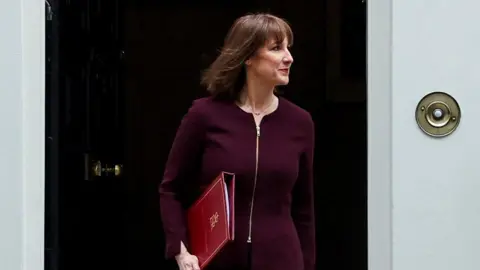Political reporter
 Reuters
ReutersRachel Reeves has squeezed the welfare budget further and boosted defence spending in a Spring Statement aimed at kick-starting the faltering economy.
The Office for Budget Responsibility (OBR) – the government’s financial watchdog – halved its growth forecast for this year to 1%.
The chancellor blamed global instability, arguing that the world was “changing before our eyes” and promising a “new era of security and national renewal”.
The OBR painted a more upbeat picture of subsequent years, predicting growth will be higher than expected thanks, in part, to more housebuilding.
The Department for Work and Pensions’ assessment finds that 3.8 million families are set to be on average £420 per year better off due to the changes.
But the government analysis suggests more than 3 million families will on average be £1,720 a year worse off by 2030 due to benefit cuts.
The Spring Statement was meant to be a routine update on the public finances but Reeves has been forced to make more extensive changes after her plans were blown off course by lower growth and higher government borrowing costs.
The Conservatives claimed it was an “emergency budget” to “clean up the mess” created by her decision in October to increase national insurance costs for business and government borrowing to fund public services.
This is hotly disputed by the government who insist they are sticking to rigid “fiscal rules” aimed at keeping a lid on borrowing – to prevent a repeat of the economic meltdown seen after Conservative PM Liz Truss’s “mini budget”.
But the OBR – which was set up in 2010 to evaluate the government’s figures – said Reeves will only manage to avoid breaking her fiscal rules through billions in public spending cuts.
The government insists the most vulnerable will be protected from cuts – but some Labour MPs have accused the chancellor of seeking to balance the books on the backs of the poor.
On social media, Labour MP Jon Trickett said: “I will not be voting for cuts to poorest people on welfare benefits. The chancellor has other options.
“Picking on disabled people is not the right thing to do.”
Another Labour MP, Brian Leishman, said he was “very disappointed” with the chancellor’s statement, saying “I’m not on board with that whatsoever” and confirmed he would not vote in favour.
Reeves also used her statement to announce a further £2.2bn for defence, while a target has been set to reduce the administrative costs of government departments by 15% by 2030.
Benefit changes
Benefit cuts announced last week were extended after the OBR said they would not raise as much money as the government had expected.
A rise in the standard rate of universal credit will be £1 a week lower than previously announced, and the health element of universal credit – which reflects a limited capability to work – will be frozen at £97 a week until 2029 for existing claimants.
An extra 250,000 people, including 50,000 children, will be pushed into relative poverty by the government’s changes, according to its own impact assessment.
And an estimated 800,000 people will lose out on personal independent payments (Pips) by 2030.
That includes 370,000 currently receiving the benefit which is set to be cut when they are reassessed under new criteria. And there will be 430,000 future recipients who will not get the Pips they would have been entitled to under the previous system.
A further 2.25 million people currently receiving the health top up to universal credit will lose an average of £500 a year as a result of the freeze, and 730,000 future recipients will lose out.
About 3.9 million households not on the health element of universal credit are expected to gain an average of £265 a year from the increase to the standard allowance.
But the government stresses there are limits to their estimates because they don’t take into account of funding for measures to support those with disabilities into employment.
They also do not take into account the new protections for those with severe lifelong conditions.





